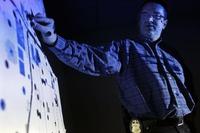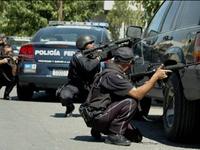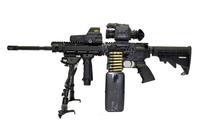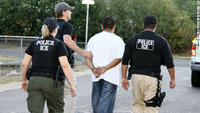-
Detecting criminals coming back to the scene of the crime
Law enforcement officials believe that perpetrators of certain crimes, most notably arson, do come back to the scene of the crime to witness their handiwork; similarly, U.S. military in the Middle East feel that improvised explosive device (IED) bomb makers return to see the results of their work in order to evolve their designs; scientists have developed a method to identify these individuals
-
-
DHS developing "pre-crime" surveillance tech

Researchers at DHS are working to develop technology that could catch individuals before they commit a crime
-
-
U.S.: Iranian agents tried to kill Saudi ambassador to U.S.

The U.S. attorney general Eric Holde rannounced yesterday that the U.S. government has foiled an Iranian plot to assassinate the Saudi ambassador to the United States; Iran wired $100,000 into a U.S. bank account in August as a down payment for the hit; the assassins — the Iranians thought they were members of a Mexican drug cartel — were to receive $1.5 million if the hit was successful
-
-
German police uses backdoor Trojan to monitor Skype calls
A backdoor Trojan capable of monitoring online activity and recording Skype calls has been detected — and is allegedly being used by the German police force
-
-
TraceSpan Communications shows new interception device
DOCSIS Phantom intercepts target communications directly from the line and collects a hundred percent of the information in both directions, to and from the ISP or communications provider; the device allows interception of all data, including peer-to-peer communication, even when it does not pass through the ISP server
-
-
Calif. Allows warrantless searches of cell phones

California Governor Jerry Brown has vetoed a bill which aimed to prohibit California police from conducting warrantless searches of the cell phones of people under arrest
-
-
Former colleagues: accused anthrax killer could not have done it
Two former colleagues of Bruce Ivins, a scientist who worked at the U.S. Army Medical Research Institute of Infectious Disease (USAMRIID) in Frederick, Maryland, and who was accused by the FBI of being behind the 2001 anthrax attacks in the United States, said he could not have done it (Ivins committed suicide in July 2008)
-
-
Mexico now dominated by two powerful cartels

Five years and more than 35,000 deaths into Mexico’s bloody drug war, two cartels have emerged as the dominant force in narcotics and the two are poised to slug it out in a dangerous battle for control; the Mexican governmen’s crackdown on the drug cartels has left many gangs splintered and operationally less effective without their leaders; in the ensuing power vacuum, the Zetas and Joaquin “El Chapo” Guzman’s Sinaloa cartel have stepped up as the two leading gangs
-
-
Alabama explores shirt-cameras for police
With the increasing availability of cheap wearable cameras, more and more police officers could be recording their every move
-
-
Colorado slashes auto-theft rate with fusion center
In 2005 Colorado had one of the highest rates of vehicle theft in the country, but thanks to the dogged efforts of local law enforcement officials and the Auto Theft Intelligence Coordination Center the state is now below the national average
-
-
Free database helps crack cold case from 1984
A cold case investigation into the whereabouts of a man who went missing in 1984 was recently solved with the help of a free online law enforcement database
-
-
Federal prison guard arrests increase nearly 90 percent

Over the past decade, arrests of federal prison guards have increased by nearly 90 percent and misconduct investigations have doubled according to a recently released Justice Department Inspector General report
-
-
Mississippi wildlife officers want bigger guns

The Mississippi Department of Wildlife, Fisheries, and Parks says it needs bigger guns; the agency hopes to purchase 250 high-powered AR-15 assault rifles to boost its crime fighting power and is currently accepting bids
-
-
Immigration raid nets nearly 3,000 illegal immigrants

On Wednesday, federal immigration authorities announced they had detained nearly 3,000 illegal aliens in the largest nation-wide raid of its kind; of the 3,000 aliens arrested, more than 1,600 were felons convicted of crimes like manslaughter, attempted murder, armed robbery, sex crimes against minors, and drug trafficking
-
-
Report finds Texas border violence worsening

A recently released report concludes that violence from the Mexican government’s war against the drug cartels is increasingly spreading into the United States; the report found that as the Mexican military cracks down further on drug cartels, these organizations have pushed further north into Texas to create a “sanitary zone”
-
More headlines
The long view
How Male Grievance Fuels Radicalization and Extremist Violence
Social extremism is evolving in reach and form. While traditional racial supremacy ideologies remain, contemporary movements are now often fueled by something more personal and emotionally resonant: male grievance.
